The great Alsace flood
After a day exploring the Route du Vins, the setting sun and rumbling stomachs signal that it's time to consult the maps to think about where to spend the night. It's early in the season, and we were confident that most of the inns and hotels weren't filled and that we could negotiate a good price on a nice room. Riquewihr looked attractive: an old double-walled village nestled into the Alsace foothills, quiet and picturesque and back from the main road.
It turned out to be a delightful small town. The cobbled main street was almost too Disney-cute, lined with colorful, half-timbered buildings, restaurants, and shops. Cartoonish stork-symbols graced every sign. But slightly off that path were narrower streets with more appealing residences, stores, and taverns. We found a cozy inn willing to negotiate half-off for a loft room with a nice cross-breeze, perfect for the evening, 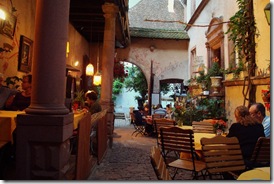 and were directed to a local Alsatian cafe set back into the older quarter. Perfect: regional food, knowledgeable waiters, and a local crowd, well away from the tour-bus hoards photographing the showcase shops. The twilight arrived, the candles were lit, and murmurs of conversation rose over Muscat and tarte flambe (a brick oven pizza appetizer).
and were directed to a local Alsatian cafe set back into the older quarter. Perfect: regional food, knowledgeable waiters, and a local crowd, well away from the tour-bus hoards photographing the showcase shops. The twilight arrived, the candles were lit, and murmurs of conversation rose over Muscat and tarte flambe (a brick oven pizza appetizer).
As the main course arrived, the waiters started opening awnings, anticipating the evening rain drifting in from the mountains. However, the drizzle quickly intensified to pounding rain. The rising wind forced everyone towards the center of the restaurant, then indoors through a cascade of water over the entryway. Lightning and thunder heralded the most intense downpour I've seen in ages. Civil sirens came to life in the distance, and the waiters dashed out of the restaurant, saying that "the forest was entering the town". Clearly, not the typical summer shower.
We headed back to the hotel through streets right out of "Singing in the Rain": water cascaded from every building, sheets of rain obscuring our view of storefronts just across the street. Torrents of muddy water rushed down the main street, bursting against parked cars and splashing against the walls. I waded through a calf-deep river, cobblestones like stepping-stones beneath the wash. Basement restaurants started to flood, people were laying boards to get across the sudden waterways. It was just an amazing scene, transformed so quickly from a peaceful evening to 'rage of nature' spectacle.
The next day, the storm's damage was more apparent. The town walls had stood for a thousand years and shouldered worse burdens, but the wash of debris on the streets showed that there had been some subsidence of the hills into the village. The flood had turned the fountain muddy; passing vehicles popped loose stones from beneath their tires, peppering buildings and bystanders with shotgunned debris. The shopkeepers pushed mud off their floors and snags away from their doorways, while others gathered to point and gesture to where the water had swept through their businesses.
The flood had turned the fountain muddy; passing vehicles popped loose stones from beneath their tires, peppering buildings and bystanders with shotgunned debris. The shopkeepers pushed mud off their floors and snags away from their doorways, while others gathered to point and gesture to where the water had swept through their businesses.
Outside of town, the vinyards looked unaffected, but the roads had crumbled and washed away in places. The police were trying to move the worst of the rubble from the roads and to piece together continuous routes through it all: signs everywhere warned of blockages and detours.
It was really a contrast to the day before although, surprisingly, not one that made the news. Only the local papers and broadcasts carried any pictures or accounts of the storm. Their accounts were very practical: upbeat assessments of the damage and assurances that the grapes and wineries were unaffected.
Labels: French culture, Picture Post, Travel stories
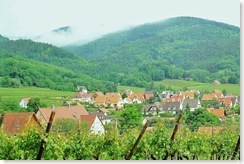
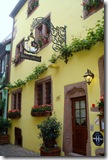
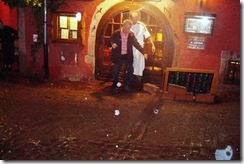
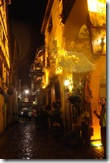
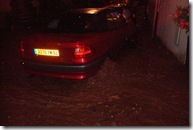
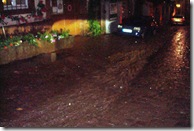
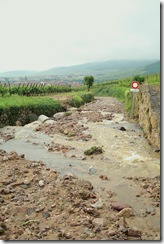
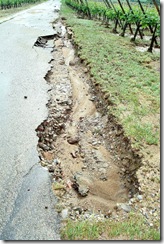
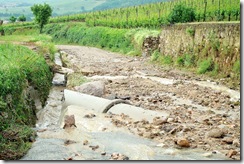
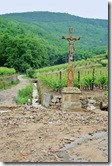

0 Comments:
Post a Comment
Subscribe to Post Comments [Atom]
<< Home